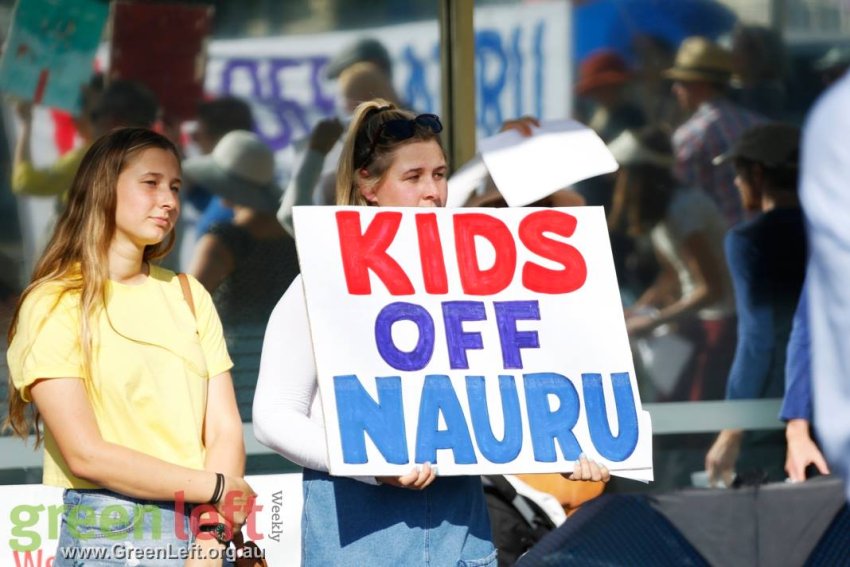
Prime Minister Scott Morrison’s “I stopped these [boats]” desk trophy is symbolic of his government’s callous disregard for human rights. But you can be sure that Morrison won’t be stopping the Nauruan government from kicking Mؘédicins Sans Frontières (MSF/Doctors Without Borders) off Nauru.
Within days of Nauru’s decision that MSF’s mental health services would “no longer be required”, news came through that an Iranian detainee on Nauru had self-harmed by swallowing washing powder.
Lawyers have had to take the Nauruan government to court to allow an Iranian child to be medically evacuated after having been on a two-week hunger strike. There are reports of other children displaying similar symptoms of the life-threatening “resignation syndrome”.
There has been an overwhelming response to the recently launched #KidsOffNauru campaign: more than 120,000 people and dozens of organisations including humanitarian, refugee, church and human rights organisations have signed up.
They want all the children and their families to be offered resettlement in Australia or “another suitable country that welcomes them” by November 20, the United Nation’s declared Universal Children’s Day.
Rural Australians for Refugees is organising a protest outside Federal Parliament on October 16. It wants the Coalition to bring the children and their families on Nauru to “safety” and for those on Manus Island and Nauru seeking refuge and asylum to be resettled.
While this has highlighted the problem of having children in detention, it doesn’t resolve the fate of others trapped in detention on Nauru and Manus Island, or those being detained onshore.
With the closure of the Christmas Island (CI) detention centre — done on the quiet earlier in October — onshore detention centres at Sydney’s Villawood, Perth’s Yongah Hill and the Melbourne Immigration Transit Accommodation are housing former CI detainees.
There are still 600 men in three detention centres on Manus Island, with a curfew from 5pm to 6am. There is no third country settlement option for the men from Iran and Sudan who have been rejected for resettlement by the United States.
An August poll commissioned by World Vision, one of the groups that launched the #KidsOffNauru campaign, reveals the impact of the government’s secrecy and lies regarding offshore detention: 60% either think there were no children detained on Nauru or were not sure.
Sixty-six per cent agreed that indefinitely detaining children on Nauru was cruel and damaging to their health and welfare.
A Guardian Essential poll on October 8 revealed that 43% are opposed to keeping asylum seekers on Nauru indefinitely, compared to 35% who support it. A narrow majority support transferring families and children from Nauru to Australia (40%) compared to 39% opposed.
But despite the horror stories of abuse and psychological trauma, fewer people support closing the Nauru detention centre and transferring all asylum seekers to Australia (37%) than those who oppose such a move (42%).
The government’s lies have had an impact. But so too has Labor’s shameful support for offshore and mandatory detention and boat turn-backs.
Labor4Refugees (L4R) is urging local branches to support a motion for Labor in government to commit to: “End all offshore detention and transfer all refugees and people seeking asylum to either New Zealand, the US, a safe third country that the refugee or person seeking asylum accepts, or bring them to Australia.
“Any refugee that is suffering physical or mental health problems as a result of their detention should be brought to Australia for care and treatment within the first 100 days of a Labor government.”
It is also calling for an incoming Labor government “to action 2015 National Conference Policy and within the first 100 days of government, initiate with the UNHCR the processing of refugees and asylum seekers in Indonesia so that those who are refugees may be safely settled in Australia or a third country”.
L4R has submitted policy for the conference to consider which includes: increasing Australia’s humanitarian intake from 27,000 to 50,000 a year; ceasing the practice of turning boats back at sea; providing protection to refugees on Manus and Nauru and placing some limits on the use of mandatory detention.
They are going to need a lot of help getting this up at Labor’s federal conference in mid-December given leader Bill Shorten told Labor delegates in March that “the boat turnback policy has been effective, and I have no interest in changing that policy.”
The campaign is not helped by apologists such as commentator Robert Manne who recently revived an earlier appeal that boat turnbacks be accepted as a compromise to get detainees off Nauru and Manus Island.
The refugee rights movement has largely rejected Manne’s “compromise”.
Pressure is building on Qantas and Virgin and other Australian airlines not to deport refugees and asylum seekers.
Anti-deportation activists are targeting the Australian Financial Review’s 100 Women of Influence Event on October 17, of which Qantas is a sponsor.
Refugee campaign groups are also converging on Canberra as part of the Rural Australians for Refugees protest. Academics for Refugees are organising a national day of action on October 17 and there will be national refugee rights actions in late October.
Teachers for Refugees is also planning events at schools across the country between November 12-16.
It is clearer than ever that change will only come through continued public mobilisation in support of refugees.
[Susan Price is a national co-convenor of Socialist Alliance and an activist in the refugee rights movement.]